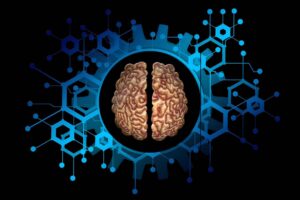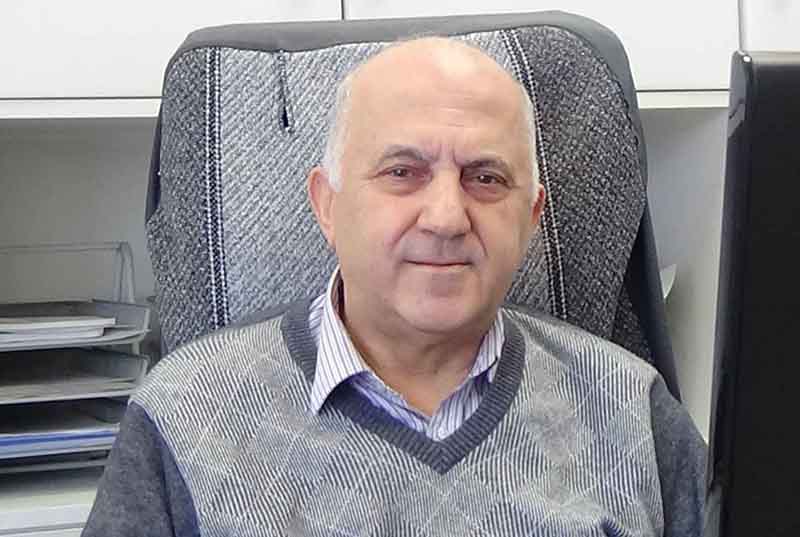In a scientist with a poetic mind THEO PANAYIDES meets a man driven by and with a love of youthful enthusiasm who now enjoys the good night’s sleep that his research demands
Andreas Ioannides, PhD has always been something of a prodigy. Back in high school in Morphou – quite a long way back now; he turns 70 in March – he was always a year ahead of everybody else, having spent each summer studying the next year’s material. He was class president and school vice-president, editor of the school newspaper and president of the Science, Debating and Philosophy societies – but also played football and basketball, and later became top scorer for six consecutive years on the University of Surrey’s basketball team. “My dream in high school was to be a ‘homo universalis’,” he recalls, sitting in the fifth-floor offices of AAI Scientific Cultural Services in Nicosia. “I started with nuclear physics because I like physics, and because it was my worst subject at school.”
Wait, what? His worst subject?
“The worst mark at school,” he clarifies. “I always like to solve problems in a different way than people advise me, and I was marked down for it.” Nuclear physics gave way to neuroscience and the study of the brain – though in fact he was never a straightforward STEM-head, his interests broader and more universal. “Literature was my real love. It still is. I’m guided by poems.”
He’s bald, round-faced, sitting at his desk with a small plastic model of a brain behind him, talking so fast he sometimes swallows his words – and his mind does indeed seem poetic in the sense of being lateral, big picture-ish, leaping ahead in the way poetry always has a tendency to leapfrog prose. His stories are candid, often self-aggrandising; he has no false modesty. He taught for three years, in Cyprus in the early 1980s – and his hope, even now, is to find and promote brilliant young people through his Laboratory for Human Brain Dynamics and Cyprus Neurofeedback Centre (both housed within AAI); I suspect he loves – and identifies with – youthful enthusiasm and stamina, as opposed to the stodginess and caution of his own age group. “I still feel 18 sometimes,” he grins, when I ask how he feels about turning 70. His style has always been restless; back at uni, his best friend was “a person who always liked to learn everything to perfection… [whereas] I always wanted to move ahead. I’d leave gaps in my knowledge, but I’d have an overview of what was happening – then go back to the things I was really interested in.”
What exactly is he interested in? Well, that varies – but the human brain has been at the forefront of his research for decades now, and indeed it’s not just research. “This is going to be the medicine of the 21st century,” he tells me with a kind of controlled excitement. “I have no doubt about that.” 
Cyprus has been slightly disappointing, though things have improved in recent years (he’s pinning a lot of hope on our new Deputy Ministry of Research and Innovation). He’s been here for 13 years now, having returned in 2009 after decades abroad – running a theory team in England and a lab in Germany, then as a team leader at the Riken Brain Science Institute in Japan. He came back for family reasons; Andreas and his Hong Kong-born wife Lichan had three-year-old – now 16-year-old – twin daughters, and he didn’t want the girls growing up in a foreign country, especially a place like Japan where foreigners find it hard to be truly accepted. He also has two sons and a daughter from his first marriage, now in their 40s – and three of the five kids (one of the sons, plus both of his half-sisters) are former or current chess champions, having been plonked down in front of a chessboard from the age of 18 months. That’s what happens when your dad is a brain researcher.
What was it like, embarking on fatherhood all over again in his 50s? “A delight,” he replies happily. I presume he didn’t lack the energy, his temper being naturally caffeinated even without his taste for extra caffeine. We meet at 11am and he’s already on his third coffee, having come to the office early enough (even though it’s Sunday) to watch the sun rise over the central Nicosia skyline; a 12-hour day is by no means unusual, though he tries to make an exception on weekends. Back in Japan, he recalls, he literally had to order employees to go home; the culture there is that no-one leaves the office until the boss does – but he could see them drooping at their desks, unable to keep up. “I can work till three or four in the morning then go back at six, seven o’clock and continue working,” he says, then gives a rueful little shrug: “When I was a bit younger”.
Age isn’t the only reason he tends to sleep a bit more these days (not much more; maybe six hours, as opposed to three). His work has also shown the benefits of a good night’s kip – and in fact that’s the second half of the equation where neurofeedback is concerned. Placing a helmet on a subject, having them watch certain images, performing a magnetoencephalogram (MEG) to measure magnetic fields generated by the brain, changing the stimuli accordingly – all that merely sets up the process; sleep is the actual healer, the way in which problems get resolved. “I have my own theory,” he explains, “that the most important thing that happens during sleep is that you reconfigure yourself.”
Come, he says abruptly, let me show you – and leads me to the next room, and a chart on the wall showing the various stages of sleep and how they impact the brain. Two specific areas, the decision-making part and the part where memory is stored, become enlarged during REM sleep (rapid eye movement, a.k.a. when you dream): his idea, says Andreas, is that “what we call the core representation of self in our brain is carried out in these two areas”. The implications are enormous, the idea being that the self – not the actual self but how we represent it to ourselves, then again is there a difference? – may be re-shaped and reconfigured during sleep, allowing the prompts made during neurofeedback (to a subject with PTSD, for instance) to ripen into a new, improved self-image. “That’s my pride,” he muses as we head back to his office, that “we do things now in neurofeedback that nobody else can do anywhere in the world.”
Sounds a bit surprising – but apparently the techniques he developed in England and Japan, plus the data generated while at the Riken Institute, allow the process to be faster and more efficient. “If somebody goes to California, for instance, they’ll pay two or three times as much to get the same treatment.”
Still seems rather strange, I point out, to discover world-class brain imaging in some random office in Nicosia.
Andreas nods cheerfully: “That’s what everybody says”.
This is something of an issue, the general ‘think small’ mentality on the island, and the resistance he’s met from officials whose minds are less poetic than his own (to put it mildly). The deputy ministry has helped, “but the ecosystem is still the same. There are the small palaces,” he says acerbically, meaning universities and other institutions, and “unless you are from one of the palaces, [civil servants] don’t know that you’re doing anything important. They won’t look in the internet to see who you are”.
AAI’s fifth-floor offices are huge – but largely empty, and not just because it’s Sunday. “I made the space like this in order to have students come here. I’ve had no student coming to us here from any of the state universities.” One brilliant young man did emerge, fresh from the English School – where Andreas taught briefly, back in the day – and “we now have a paper together”, but most of the people he meets lack his thirst for knowledge and intellectual restlessness: “In Cyprus there is the idea, from the families, that if you finish university you don’t have to open a book again!”.
He himself was something of a prodigy, of course – though the word may be slightly inaccurate, insofar as it implies some great natural talent. Take basketball, for instance: “I was not talented. In football and basketball, I was not technically talented. It was through a lot of practice”. He’s not necessarily built for the game (he’s not particularly tall, is what we’re saying here) – but he practised ‘outside shots’ as a teenager in Morphou, and became pretty good; he’d score “30, 35 points per match” for the Uni of Surrey team, in a time before three-pointers. He recalls going out after lunch and taking shots for hours on end – just as he used to spend his summer studying the entire next year’s syllabus, just as he now comes to the office at sunrise and stays till dark. Sounds like he’s a workaholic, I suggest – but he shakes his head: “No, I’m not a workaholic. I like what I’m doing”. A bit obsessive, then? “Yeah, I’m obsessive. I like to live the things I like in full… It’s the only way to live”.
His personal life may have suffered over the years (Lichan is herself a neuroscientist, which helps). He’s held top positions, but hasn’t made a great deal of money – nor, I imagine, is he universally popular. Some may find him cocky, or over-confident; it’s unclear how patient he is, or how willing to suffer fools gladly. He’s demanding, for sure. He left the English School after a year, “because nobody was interested in doing anything more than what was [required] in the class, so I decided to leave”.
In the end, the object of his study suits him perfectly – the human brain being enormously powerful yet also fluid, a work in progress, shaped by evolution, subject to rewiring by emotional appeals and indeed the kind of moulding that happens in neurofeedback. Andreas, too, is always growing (or trying to grow; it’s not always up to him), leaping ahead and fixing his gaze on the big picture. His plans for the company are big, maybe too big: “My dream is that, from this place here, we’re going to get the big prizes. Not me – I mean, I’m approaching 70, probably past it – but some of the people that work here are going to get some of the big prizes.”
Big prizes?
“I don’t want people to get Nobel prizes by working abroad,” he replies, speaking the N-word out loud. “I came back here [to Cyprus] because I think everything is feasible from this place – if you believe it.”
The work they do is already important: “We work now on sleep, how to give up smoking – addiction in general – and depression,” he tells me – but there’s also something bigger in the pipeline, “a revolution in what I do”. Solid-state is apparently replacing liquid helium in the science of MEG, a technical advance that’s way above my paygrade – but Andreas is thrilled, his restless mind glimpsing yet another chance to try something new and revolutionary. I recall what he said earlier, when discussing the way sleep can alter our perception of the self, turning trauma into memory and subtly rearranging our mental furniture: “There is no self. The self is continuously evolving”. He too – even now, standing on the threshold of his eighth decade – continues to evolve, still in thrall to science and the pursuit of knowledge in general. And poems, I guess.







Click here to change your cookie preferences